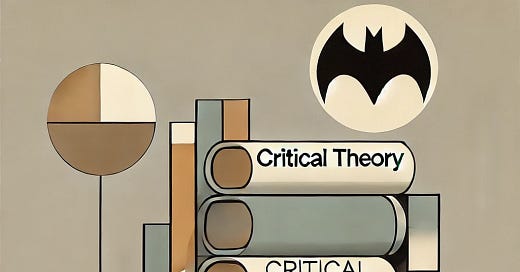Contra critical theory
Academics are often rewarded for discovering novel ways of criticising and condemning Western societies. This generates lots of biased, one-sided scholarship.
I.
Academic research is a status game.
For example, Robert Merton famously observed that science is a credit economy in which scientists compete to win prestige (i.e., get credit) for making novel discoveries. This reward system is science’s engine, motivating scientists to invest time, energy, and ingenuity into advancing the frontier of human knowledge. Of course, intellectuals have always sought glory by making bold discoveries. However, whereas great scholars of the past rarely made sustained progress, the Scientific Revolution produced a novel way of distinguishing good ideas from bad ones. Instead of evaluating conjectures based on scripture, charisma, or clever argumentation, it applied a revolutionary new standard: only empirical evidence counts.
The humanities are also a status game. Like scientists, scholars in the humanities invest considerable time, energy, and ingenuity into generating new ideas. Although some of this is motivated by a mixture of sincere curiosity and mundane careerism (“publish or perish”), much is powered by intense status competition. The academics who get credit for producing the best new ideas win social recognition, certified by things like large citation counts, big audiences, prestigious talk invitations, and publications in impressive journals. However, empirical evidence is not the ultimate judge of new ideas in the humanities. Often, it plays no role at all. How, then, are novel ideas evaluated?
There is no single answer to this question. Different disciplines and subdisciplines reward different things, and standards change over time. Nevertheless, some generic qualities are valued. Contributions should generally be clever, original, engaging, and persuasive. They should advance pre-existing conversations or create interesting new ones. They should also be “trendy” in some difficult-to-define sense. In this post, however, I want to focus on a very different kind of value: throughout much of the humanities, there is a market for novel critical ideas. Specifically, scholars compete to win status by producing innovative new ways of criticising and condemning Western societies.
II.
In a recent interview, economist Larry Summers describes an experience he had meeting faculty from the American Studies Department when he was President of Harvard:
“They talked about what they were doing, and each person talked about how they were exploring the victimisation of some group within the population. Then somebody who hadn't really gotten the playbook because she was a professor at the business school had the nerve to say what I was thinking, which was that America's been the most successful country in the history of the world. It is the country to which people from all over the world want to come that has been the light of the Earth for a very long time, and one might think that some part of the field of American studies would be about how that happened and yet nobody's talking about that at all. And I thought that was a completely fair question.”
After reflecting on this experience, Summers notes that he occasionally looks through the Journal of American Studies:
“It would be more accurately described as the Journal of Anti-American Studies because almost everything in it is directed at in some way a condemnation of America.”
I sympathise with Summers’ assessment. Although I do not have any objective data, my overwhelming impression is that much scholarship in the humanities is oriented towards the criticism and condemnation of Western societies. This is certainly not universal. (It does not play much of a role in analytic philosophy, for example). However, it seems undeniably widespread. For instance, the intellectuals who have most spectacularly won the humanities’ status game—with Michel Foucault at the top of the league table—devoted much of their intellectual energy and ingenuity to pursuing this goal.
III.
Of course, the thirst for critical ideas is explicit in critical theory.
Keep reading with a 7-day free trial
Subscribe to Conspicuous Cognition to keep reading this post and get 7 days of free access to the full post archives.




